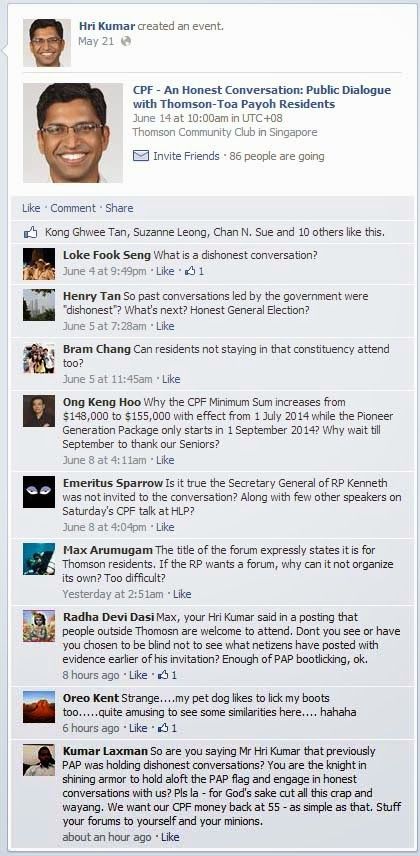In law, sub judice, classical Latin literally for "under judgment" (Latin sub iūdice : sub, beneath, before + iūdice, ablative of iūdex, judge.), means that a particular case or matter is under trial or being considered by a judge or court and therefore prohibited from public discussion elsewhere.
That's not stopping the Ministry of Health (MOH) from blabbing about it. Worse, as Ravi pointed out, MOH is not party to Mr Ngerng's contract of employment. Tan Tock Seng Hospital's (TTSH) sacking may be a case of jumping the gun, given the lawsuit - which neither involves TTSH and MOH - has yet to run its course. Having said that, we know that an opposition political leader did lose his job over taxi claims.
TTSH and MOH are not legal experts, so maybe we can cut them a little slack. But that leeway cannot be extended to the National University of Singapore (NUS) which is supposed to have a reputable Law Faculty.
Professor Tey Tsun Hang is back in the limelight, after filing papers in an attempt to get the High Court to force NUS to reinstate his position as tenured professor. One fine point of law has to do with carrying out displinary proceedings against him before initiating the firing. The sacking was another instance of jumping the gun, as he was free to appeal, and which happened to turn in his favour. The decision was "illegal, irrational and procedurally improper," Tey claims.
We are dealing with academics here, and their interpretation of the law may be different from practitioners. Here we have NUS appearing to be cognizant of sub judice, saying "As Mr Tey's application to the court is a legal matter, we have referred this case to the lawyers", right after going on in lurid detail about misconduct and impropriety. When do these guys ever learn to shut up?
Which reminds us of a practising lawyer who also failed to zip up, and went down defending a "public dialogue" on CPF titled “CPF – An Honest Conversation”. Let the lawyers define "public" and "honest". Mere mortals have better things to do, you know, take care of the mortage, put food on the table, get to work on time and avoid being sacked at the drop of a hat.

That's not stopping the Ministry of Health (MOH) from blabbing about it. Worse, as Ravi pointed out, MOH is not party to Mr Ngerng's contract of employment. Tan Tock Seng Hospital's (TTSH) sacking may be a case of jumping the gun, given the lawsuit - which neither involves TTSH and MOH - has yet to run its course. Having said that, we know that an opposition political leader did lose his job over taxi claims.
TTSH and MOH are not legal experts, so maybe we can cut them a little slack. But that leeway cannot be extended to the National University of Singapore (NUS) which is supposed to have a reputable Law Faculty.
Professor Tey Tsun Hang is back in the limelight, after filing papers in an attempt to get the High Court to force NUS to reinstate his position as tenured professor. One fine point of law has to do with carrying out displinary proceedings against him before initiating the firing. The sacking was another instance of jumping the gun, as he was free to appeal, and which happened to turn in his favour. The decision was "illegal, irrational and procedurally improper," Tey claims.
We are dealing with academics here, and their interpretation of the law may be different from practitioners. Here we have NUS appearing to be cognizant of sub judice, saying "As Mr Tey's application to the court is a legal matter, we have referred this case to the lawyers", right after going on in lurid detail about misconduct and impropriety. When do these guys ever learn to shut up?
Which reminds us of a practising lawyer who also failed to zip up, and went down defending a "public dialogue" on CPF titled “CPF – An Honest Conversation”. Let the lawyers define "public" and "honest". Mere mortals have better things to do, you know, take care of the mortage, put food on the table, get to work on time and avoid being sacked at the drop of a hat.



